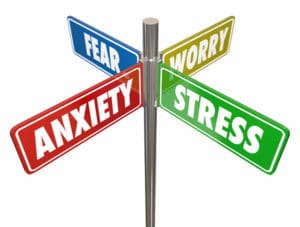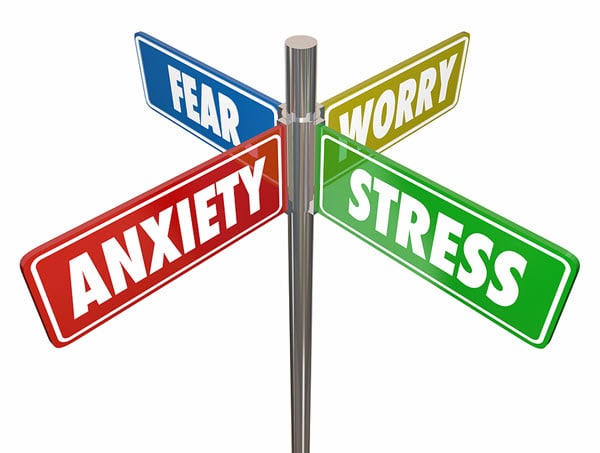Table of Contents
If you feel anxious, some nootropics can make you feel better by helping to calm your mind. They work by supporting the brain chemicals that control mood and stress. Certain amino acids and ingredients such as L-Tyrosine and Bacopa Monnieri can help you to feel and stay relaxed, focused and happy. The aim of this guide is to help you find the best nootropics for anxiety and how they can make you feel more at ease.
In a hurry?
If you’re in a hurry or just looking for my nootropic of choice when it comes to easing anxiety, I would recommend Mind Lab Pro. The formula has been created based on research and can help you to stay calm, focused and stress-free. Unlike other supplements, its clean, effective and can be used long term to improve your overall brain health. – Click here to learn more about Mind Lab Pro
Key Takeaways
- Understanding the root causes of anxiety, often associated with neurotransmitter imbalances, is crucial.
- Certain nootropics can be effective in alleviating anxiety symptoms by targeting specific neurotransmitters.
- Acetylcholine, dopamine, and GABA are some neurotransmitters related to anxiety, and supplements like Alpha GPC, CDP-Choline, and L-Tyrosine can help modulate their levels.
- A trial-and-error approach may be necessary to find the most effective nootropic for individual anxiety relief.
- Nootropics offer a natural alternative to traditional anti-anxiety medications, with the potential for fewer side effects1.
This post is for you if tried anti-anxiety meds, Cognitive Behavioral Therapy, counseling, or psychotherapy. And are looking for a natural nootropic alternative to reduce anxiety.
Or maybe you tried talking to your doctor about how you feel and didn’t get the help you need.
It may be of little comfort, but did you know there is a 77% chance that your anxiety has been misdiagnosed as some physical problem instead?[i]
Because anxiety often manifests as sweating, trembling, nausea, abdominal problems, dizziness, insomnia, heart palpitations, accelerated heart rate, chest pain, shortness of breath, pins and needles, feeling like your losing control and/or feelings of impending doom.
Instead of dealing with the real cause, maybe you were sent down the wrong path. And are still looking for answers.
Nootropic supplements may help if you’re dealing with a genuine anxiety disorder. The kind of anxiety that has you feeling constantly on-edge and an overwhelming sense of dread.
The type of anxiety where you have difficulty concentrating, you’re irritable or restless to the point you’re avoiding family and friends just to numb yourself from feelings of worry and unrelenting doom. Stress hormones go nuts.
You know, it’s that very type of stress that makes your blood pressure rise from doing too much, or being stretched thin and depression symptoms start to peak through your window and you may even begin to manifest this unresolved energy into panic attacks? Yeah, we’re talking about that kind.
Here you’ll discover the real cause of your anxiety symptoms. And get some help dealing with how you feel. Concrete steps to take that doesn’t include meditation, yoga, Cognitive Behavioral Therapy, or psychoanalysis.
The Root Cause of Generalized Anxiety Disorder
Something may have happened that triggered the anxiety that has turned your life upside down. But if your feelings of anxiety are hanging on and won’t let go, it’s likely because of the dysfunction of neurochemicals in your brain.[ii]
It could be problems with acetylcholine, dopamine, GABA, glutamate, norepinephrine, or serotonin.
But the challenge is figuring out which neurotransmitter is causing the problem. And why drugs like benzodiazepines, SSRIs, SNRIs, TCAs, and MAOIs are often prescribed for treating anxiety.
How to Find the Root Cause of Your Anxiety Symptoms
 If you have been using an anti-anxiety drug and experienced some relief in your symptoms, you have a head-start.
If you have been using an anti-anxiety drug and experienced some relief in your symptoms, you have a head-start.
Because now you have a clue what could be causing your problem. And it may be easier for you to decide which nootropics to try to help you get better and reduce your anxiety.
First, become familiar with the mechanism of action (or pharmacology) of the med you are using. Find out how the drug works in your brain. Wikipedia.org is a good resource for this information.
Simply do a search of Wikipedia for your drug’s generic name. And scroll down to the section “Pharmacology”. Sometimes called the “mechanism of action”.
Once you understand how the drug works in your brain. And which neurotransmitter system it affects. Scroll down the list of nootropic supplements below.
And choose one of the anti anxiety nootropics that has a similar mechanism of action to the drug you were using. Then follow the dosage recommendations for that supplement and try it to see if you feel any anxiety relief.
Typical signs of relief can include positive cognitive performance like reduced brain fog and mental fatigue, less emotional stress, and lowered blood pressure.
Anxiety Caused by Neurotransmitter Dysfunction
Anti-anxiety meds are usually some type of benzodiazepine. Benzos work on GABA receptors. So, a nootropic that boosts GABA may help relieve your anxiety.
But if you’ve never tried using an anti-anxiety med to treat your anxiety, or have used one that didn’t work, you’re anxiety may be caused by something other than GABA.
This is where trial and error and the willingness to experiment comes into play. And this is how it works.
Start at the beginning of the list below and try the first nootropic supplement for 1 or 2 days. And see how you feel. If you experience relief from your anxiety symptoms and improved mental health, success!
Now you know which neurotransmitter to work with. You can continue using that nootropic as recommended. And look for other natural nootropic adaptogens that work on the same system.
For example, if L-Tyrosine helps relieve your anxiety symptoms then you know that dopamine is your problem. But if L-Tyrosine is not enough and only provides some relief, then look for other nootropic supplements that also affect dopamine.
Other supplements that affect how dopamine works in your brain include Oat Straw extract, Polygala Tenuifolia, L-Theanine, St. John’s wort, and Ginkgo Biloba.
But if L-Tyrosine doesn’t provide any comfort for lowering your anxiety, put it aside. And try the next nootropic on the list below for a couple of days again following dosage recommendations.
Go through the list one-by-one until you find a nootropic that helps you and relieves at least some of your anxiety symptoms.
Most of the nootropics on the list below are precursors. Which means it provides the chemical or molecule needed to make or increase levels of a specific neurotransmitter.
Let’s get started …
 Neurotransmitter imbalances
Neurotransmitter imbalances
Acetylcholine
Acetylcholine is your major signaling neurotransmitter and plays a critical role in learning and memory. And acetylcholine levels are modulated by levels of stress in several regions of your brain.
Acetylcholine levels also decline as you get older. You need choline for the production of acetylcholine. Not eating enough foods high in choline can also result in insufficient acetylcholine.
In fact, choline is so vital to cognition and nerve function that, without it, we couldn’t move, think, sleep or remember anything.
Studies show that acetylcholine signaling in your hippocampus regulates social stress resilience and anxiety.[iii]
The only two nootropic supplements that can effectively increase acetylcholine levels in your brain are Alpha GPC or CDP-Choline (Citicoline) used with the cofactors Acetyl L-Carnitine (ALCAR) along with Vitamins B1 & B5, magnesium and Vitamin D.
Alpha GPC
 Alpha GPC is a precursor to the neurotransmitter acetylcholine. Alpha GPC naturally occurs in your brain as a byproduct of phosphatidylcholine (PC).
Alpha GPC is a precursor to the neurotransmitter acetylcholine. Alpha GPC naturally occurs in your brain as a byproduct of phosphatidylcholine (PC).
When your brain needs more choline, and the choline floating around in your brain is running low, it breaks down PC from cell membranes. And turns it into Alpha GPC.
Alpha GPC, acetyl L-carnitine (ALCAR), and phosphatidylserine (PS) provide mitochondrial support and conserve growth factor receptors.
DHA (Omega-3) combines with phosphatidylcholine (PC) and phosphatidylserine (PS) to form brain cell membranes critical for neuron generation and regeneration.[iv]
Recommended dosage of Alpha GPC is 300 mg 3-times per day.
And I use and recommend: Performance Lab® Omega-3 which provides your brain with DHA. And Mind Lab Pro® which provides Phosphatidylserine (PS) along with 10 other effective nootropic ingredients.
CDP-Choline (Citicoline)
CDP-Choline is a type of choline that is present in every cell in your body.
Taken as a supplement, it’s then converted to cytidine and choline in your gut. Once it crosses the blood-brain barrier it’s converted back to CDP-Choline.[v] The choline then assists cell membranes and helps create acetylcholine.
CDP-Choline is involved in memory and cognitive functions. And provides energy for the brain to conduct sustained mental effort.
Recommended CDP-Choline dosage is 250 – 300 mg twice per day. I use and recommend Mind Lab Pro® which contains 250 mg Citicoline.
And by the way, you only need to use one to test your acetylcholine levels. Use either Alpha GPC or CDP-Choline with Acetyl L-Carnitine (ALCAR). There is no need to use both. Either one will work.
Dopamine
L-Tyrosine taken as a nootropic supplement converts into the neurotransmitter dopamine. The cofactors in dopamine synthesis include Vitamin B6, B9, & B12, magnesium and Vitamin D.
 Dopamine helps control muscle movement in your body, is fundamental to memory, attention and problem solving.
Dopamine helps control muscle movement in your body, is fundamental to memory, attention and problem solving.
The unused dopamine can then convert into the catecholamine neurotransmitters norepinephrine (noradrenaline) and epinephrine (adrenaline).
Norepinephrine is important for attentiveness, emotions, sleeping, dreaming, and learning.
Epinephrine drives your ‘flight-or-flight’ response. It’s what prompts your reaction to dangerous circumstances, emergency situations, or in stressful situations or environments.
Sleep deprivation and extreme stressors like heat and cold can deplete catecholamine levels. L-Tyrosine restores them to preserve optimal cognition and reduce anxiety.[vi]
Recommended dosage of L-Tyrosine is 500 mg twice per day.
I use and recommend Mind Lab Pro® which contains 175 mg N-Acetyl L-Tyrosine along with 10 other potent and effective nootropic ingredients.
GABA
GABA (Gamma-amino butyric acid) is the most abundant inhibitory neurotransmitter in your brain. And known to counterbalance the action of the excitatory neurotransmitter glutamate.
GABA has long been recognized as the main regulator of anxiety. And the GABA neurotransmitter system is the main target of benzodiazepines and other anxiety related drugs used to treat anxiety disorders.[vii]
When GABA is taken as a nootropic supplement, and contrary to what you may have read elsewhere, crosses your blood-brain barrier, it binds with the GABAA receptor protein complex, and acts as an agonist: inducing changes in which the permeability of the central pore to chloride ions gets increased.
The resulting chloride flux hyperpolarizes the neuron, leading to a reduction in its excitability. And producing a general inhibitory effect on neuronal activity.[viii]
Recommended dosage of GABA is 250 – 500 mg per day. I use and recommend PharmaGABA® which is a natural form of GABA grown on lactobacillus hilgardii bacteria. Several supplement manufacturers license the use of PharmaGABA® so it is easy to find in your local vitamin shop or online.
Glutamate
L-glutamine is a ‘conditionally’ essential amino acid and main precursor for the production of glutamate and GABA in your brain.
(NOTE: Don’t confuse glutamine with glutamate!)
Glutamine is the most abundant amino acid in your body. And is involved in many of your bodily functions. Including much of the activity in your brain.
 But Glutamate is the main excitatory neurotransmitter in your brain.[ix] And the balance of glutamine and glutamate is critical for optimal brain function.
But Glutamate is the main excitatory neurotransmitter in your brain.[ix] And the balance of glutamine and glutamate is critical for optimal brain function.
Glutamate plays various important positive roles in your brain including brain development, learning and memory.
And degenerative roles including stroke, traumatic brain injury, Huntington’s and Alzheimer’s disease, stress response, and anxiety disorders.
Glutamate mainly acts through ion channel receptors including NMDA receptors, AMPA receptors, and G protein-coupled metabotropic receptors (mGluR1-8).
Glutamate is involved in synaptic release of acetylcholine, adenosine, kappa opioid, GABA, and neuropeptides.[x]
Recent research shows that glutamate dysfunction is involved in fear conditioning, OCD, PTSD, anxiety disorder and social phobia.[xi]
Monosodium glutamate (MSG) which is used as a flavor enhancer has been linked to obesity, metabolic syndrome, and neuron toxicity that can lead to cell death causing stroke, epilepsy, schizophrenia, anxiety, depression, Parkinson’s disease, Alzheimer’s disease, Huntington’s disease, and amyotrophic lateral sclerosis (ALS).[xii]
Eliminating your anxiety could be as simple as avoiding all foods containing MSG.
When your neurotransmitters, including L-glutamine and glutamate are in balance, you feel motivated, productive, and energetic. And you feel calm and relaxed during downtime.
When L-glutamine levels are low you feel filled with dread, you’re constantly worried, you have racing thoughts, and you’re frequently late and disorganized.
When you are in this L-glutamine slump is when you’re tempted to resort to high carbohydrate foods, and drugs or alcohol to relax.
Recommended dosage of L-Glutamine is 2 – 5 grams per day.
But remember, glutamine and glutamate must be in balance! If you suspect your glutamate levels are too high, you can get it under control by inhibiting its NMDA and AMPA receptors.
Some antidepressant drugs relieve anxiety by inhibiting NMDA receptors.[xiii]
Try the nootropics including Cat’s Claw[xiv], and L-Theanine[xv] for inhibiting NMDA receptors. And Noopept[xvi] and many of the racetams[xvii] which inhibit AMPA receptors.
Keeping glutamate under control and helping to reduce anxiety if your condition is caused by glutamate dysfunction.
Serotonin
Serotonin plays a significant role in the development and persistence of anxiety disorders.
 Several studies show that increases in serotonin increases anxiety. And when serotonin decreases you may experience a reduction in the anxiety that’s associated with OCD or PTSD[xviii].
Several studies show that increases in serotonin increases anxiety. And when serotonin decreases you may experience a reduction in the anxiety that’s associated with OCD or PTSD[xviii].
Too much serotonin and excess serotonin signaling has been implicated in social anxiety disorders.[xix]
If you are experiencing any type of anxiety, you should avoid anything that increases serotonin. Do NOT use nootropics like L-Tryptophan or 5-HTP. Because L-Tryptophan or 5-HTP are the only nootropic supplements that can directly increase serotonin levels.
Instead, use nootropics that help modulate serotonin and bring it under control.
Bacopa Monnieri helps modulate serotonin and dopamine which produces an anxiolytic effect. Studies show that Bacopa Monnieri is as effective as the anti-anxiety drug lorazepam in reducing anxiety.[xx]
Vitamin D3 and Omega-3s (EPA & DHA) helps control serotonin synthesis and action. EPA helps inhibit serotonin release and DHA influences serotonin receptors. While Vitamin D3 deficiency can contribute to anxiety.
Supplementing with Omega-3s and Vitamin D3 may help reduce anxiety.[xxi]
I use and recommend Performance Lab® Omega-3 and Performance Lab® (NutriGenesis®) Vitamin D3 + K2
Ginkgo Biloba acts as a monoamine oxidase inhibitor (MAOI) which helps boost dopamine in your brain. Increasing dopamine can help lower serotonin levels. The result can be a reduction in anxiety.[xxii]
Rhodiola Rosea is an adaptogen that has been used in traditional medicine for thousands of years. Rhodiola Rosea enhances stress tolerance and relieves anxiety by modulating key brain neurotransmitters such as serotonin, norepinephrine and beta-endorphins (opioid neuropeptides).[xxiii]
Anxiety Disorders Eliminated
Nootropics can be a viable and potent alternative to many anti-anxiety medications.
But you first need to determine the cause of anxiety in your brain. Use the trial and error method I suggested above and work through the nootropic supplements I recommended one-by-one.
If you are not experiencing any results from taking a single nootropic, it may be that a combination of nootropics may be required to get the job done, and once the cross the blood brain barrier, have an effect.
Just remember, that the goal of experimenting is to find what works best for you is so you can determine what gets you the best results for reducing stress, improved mental energy, and reduce anxiety symptoms.
But a very strong word of caution – if you are currently using any prescription anti-anxiety or antidepressant medications. Or any medications for that matter. Research each nootropic including side effects and prescription drug interactions before using them.
You can relieve anxiety and start feeling some relief from stress, Hopefully once-and-for-all by using the right nootropic supplements.
But this will only work if you do your research. And are willing to experiment until you find the nootropic supplements that are right for you, and mental clarity will come.
What Do I Recommend?
If you’re looking for a stack to help improve brain health, my recommendation would be Mind Lab Pro. The formulation of L-Tyrosine, Bacopa Monnieri and Rhodiola makes it a great nootropics for anxiety. It can help you with managing anxiety by reducing stress, balancing mood levels and enhancing focus.







Join The Discussion - 190 comments
alex
September 24, 2024
i saw some health benefits of L-tryptophan and 5-htp for anxiety on other sites, should i use it or no? since it was mentioned up there that it is not recommended for anxiety…
David Tomen
September 26, 2024
Alex, Tryptophan or 5-HTP will help with anxiety only if your anxiety is caused by a problem with serotonin. If you want to test it then start with Tryptophan because it is easier to get the dose right and likely safer to use long-term. But if you use either long-term you’ll need to support dopamine as well otherwise serotonin and dopamine get out of balance and you’re worse off than when you started.
Jason Shim
July 31, 2024
Hello David,
I was trying to talk to people who are having anxiety disorder but none is available at the moment.
Im experiences weird feeling, like heavy pressure around my chest, head and back. It cause breathing difficulties, headaches. Also on my shoulder. The pressure seems so real, because I feels like carrying extra weight!!!
Do you think it could possibly be related to anxiety disorder?
David Tomen
August 1, 2024
Jason, of course there are supplements that help with anxiety disorders. You just need to be willing to experiment until you find what will work for you.
I suggest reading the above article from top to bottom. If your anxiety is caused by neurotransmitter dysfunction that give instructions on how to test each one. Start at the top of the list and work your way down.
Or you could try adaptogens (https://nootropicsexpert.com/top-7-nootropic-adaptogens-to-conquer-anxiety-and-stress/). But the same technique is used. Try each supplement until you find one or two that works.
Jason Shim
August 2, 2024
Hi David
If ALCAR ( weird sensation and muscle tension intensified) and L-Tyrosine (crazy muscle spasms) makes my condition worse. Would GABA likely to help my condition?
David Tomen
August 6, 2024
Jason, I suggest experimenting with Tryptophan to increase serotonin. And PharmaGABA to increase GAGA. Give each 2 – 3 days of consistent use one at a time and see if either makes a difference.
Jason Shim
August 8, 2024
David, I don’t have Tryptophan and GABA. But I do have experience taking sertraline and alprazolam. Sertraline just makes me emotionally blunt, I can’t even enjoy a movie. Alprazolam basically took away or reduce my symptoms. I feel like myself again. Should I continue to take alprazolam or get the GABA supplement?
Would alprazolam cause brain damaged?
David Tomen
August 13, 2024
Jason, please read this all the way through and then decide if you are going to continue with: https://en.wikipedia.org/wiki/Alprazolam
alex
June 6, 2024
can i take L-tyrosine, gaba and L-theanine together for my anxiety?
David Tomen
June 6, 2024
Alex, it depends on the cause of your anxiety. Those supplements may or may not work for you. I suggest trying them and you’ll know if they work for you.
Nico
May 3, 2024
Are there studies showing that monosodium glutamate in foods is harmful to neurons, brain, headaches, etc.? What’s the difference, sodium?
David Tomen
May 3, 2024
Nico, read the 2nd paragraph in this study on MSG: https://www.ncbi.nlm.nih.gov/pmc/articles/PMC5938543/
J
March 17, 2024
So glad I found this. I knew that someone out there was thinking about this properly – like a mechanic! figure out the missing piece. Love it. I have started on my journey as we speak. Thank you for the excellent information and the validation of this type of appraoceh..
By the way – Bacopa Monnieri has given a lot of people blunted emotions, decreased motivation (too much serotonin I am told), and may not be the best regulator as it may actually push serotonin too high. You would know more. However, Lucas Aoun, someone that has had the worst of experiences with serotonin, talks about serotonin a lot and has a podcast called “3 supplements i changed my mind on” and goes into detail about this.
Thanks again!
David Tomen
March 18, 2024
I have done a couple of podcasts with Lucas and am well aware of his experience with Serotonin.
But if you think your anxiety is due to a neurotransmitter dysfunction, the article above explains how to use the process of elimination to help you figure out which one is causing the problem. Don’t listen to what anyone else says. This is all about you and what you are experiencing. Bacopa Monnieri is not on the supplement list above so you don’t need to worry about it.
Eric S
February 8, 2024
Hi David – in your Tryptopjan article , you state that it reduces anxiety. In this article , you state to NOT take it as it can increase anxiety. Which is correct?
David Tomen
February 9, 2024
Eric, excess Tryptophan an cause anxiety. The keyword is “excess” or too much Tryptophan.
Chloe
April 15, 2024
Could i use Bacopa with Tryptophan or one cancels the other?
David Tomen
April 22, 2024
Chloe, Bacopa Monnieri will likely potentiate the way Tryptophan works.
Manny
February 2, 2024
Hi David,
My struggle with anxiety has been debilitating and worsening. Everything from all day / all night general anxiety and never at peace, to massive social anxiety, and also overthinking and using my imagination how a day or event should occur and when it goes sideways then total anxiety attack occurs. Also poor sleep and mind control after waking up.
Coming across your website has opened up my analytical mind and research and I’m so thankful I found it. Beyond vitamins, minerals, etc…, my questions ( for now haha ) starts with my first attempt at your list and which classification of neurotransmitter to go after first.
My only limited experience with meds is a buddy giving me some xanax and i find it works, i’m starting with the GABA side first. But also read that xanax work with dopamine also so???? Under Dopamine you mention L- Tyrosine and under GABA you mention GABA. From other readings and i don’t see it on your list, i am experimenting with L-theanine and from 2 days usage, i cant tell if its a mind trick or ots working. It does where off IF its working. Im wondering if…1. Why you dont list L theanine and should i switch to L- tyrosine? And for GABA, I’ve heard that its more of a nightly use bc it makes you tired verse Theanine etc.
Last. I’ve read of resistance building up and a need to rotate. What are your rotations for each neuro or at least a rotation for
L-theanine
GABA
L-tyrosine.
Thanks a bunch!!
Manny
David Tomen
February 5, 2024
Manny, I an not an advocate of cycling most supplements with a couple of exceptions. Because you do not get the benefits of a supplement on the days you don’t use it.
And L-Theanine is not a precursor to the synthesis of dopamine. You cannot “switch” L-Theanine for L-Tyrosine. The dopamine pathway looks like this: Phenylalanine > L-Tyrosine > L-DOPA > dopamine > norepinephrine > epinephrine. L-Theanine is no where in that pathway.
Ellen
January 6, 2024
Thank you first for your time. I am 80 years old and my husband is the same age. Just connected the dots and realized he has ptsd. He was never diagnosted. Dealing now with nightmares, etc. He has never discussed his past, and is in denial so I am doing everything I can including GABA and a supplement for stress, which includes valarian root, and other herbs, plus magnesium glycine. He is on a very low carb diet since his heart attack four years ago and his bloodwork is excellent, we exercise by walking everyday. His blood pressure was great 110 over 70, but recently went up to 140 over 85. This made me realize that it was not what he was eating, but what was eating him. I can’t approach the subject and he refuses to discuss with the doctor. Is there anything I can do in addition to what is above. Thank you so much for your time, I am truly alone in this, and have been an advocate of diet and lifestyle for over 40 yers.
David Tomen
January 9, 2024
Ellen, this is a great line, “This made me realize that it was not what he was eating, but what was eating him.” Thank you for that. You just made my day!
Please see my article on PTSD here for other ideas: https://nootropicsexpert.com/treating-post-hurricane-ptsd-with-nootropic-supplements/